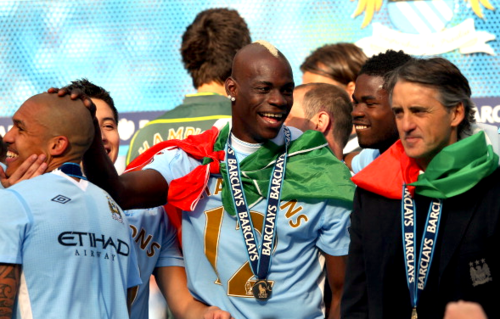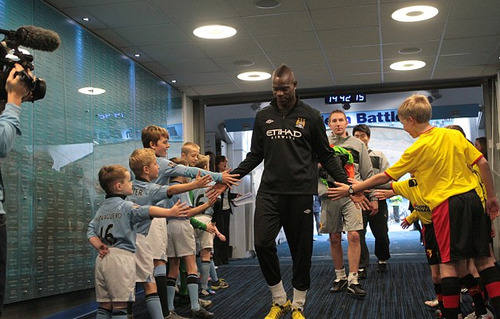Preparing for a new, better Baloitalia
Preparing for a new, better Baloitalia


No matter what, they always returned to one another. The quarrels, the disbelief, the losses in composure never once compromised this enduring relationship, ruined it beyond repair. Roberto Mancini, the coach of Manchester City, couldn’t stop loving Mario Balotelli. And even though the two will part again, for the second time in five years, they do so only in person, not in spirit, not forever.
Mancini, before watching his side draw with lowly Queens Park Rangers, met with his 22-year-old pupil in a London hotel and most likely cried with him. “It was emotional,” Mancini later said. Like a parent, Mancini did what was best for Mario: he let him go. You could hear in the manager’s voice and in his words, as he tried to rationalize the player’s move to AC Milan with reporters after the match on Tuesday, a sense of regret, perhaps even a little disappointment in himself that he couldn’t raise his student any more.
See, the decision to sell Balotelli had been made weeks ago, the backroom staff at City and Mancini himself — though he had once granted the Italian striker “100 more chances” — reaching a point of no return. Balotelli was too much, thought to be a deterrent to the club’s ambitions, a bigger gamble than he was worth. That the club accepted an offer well below their initial valuation of the player — Milan, not budging, negotiated the price down to €20 million from €37 million over the past month — suggests a particular urgency to rid themselves of a dilemma. But Mancini was always Balotelli’s advocate. And he still is.
“I think he can improve and I’m happy he will become one of the best players in the world,” Mancini implored, as if knowingly, standing by Balotelli until the very end. “For me, he was not a problem. Mario was like another one of my children. You can be upset with him sometimes, but he’s a lovely lad.”
In Manchester, the scene wasn’t so much foreign any longer. But it was cold and rainy, a pathetic fallacy for a career in fog, without any real direction. He had scored just once this season out of 34 shots, playing with his poorest conversion rate at 2.9%. He had spat with Mancini, stormed off the pitch and threatened legal action against City over a tw0-week fine for missing 11 of City’s 54 matches last season through suspension. No, now the scene had become combative, and Balotelli, who always loves to control his own narrative, had become the antagonist of City’s story. He lost his way. And when Milan came calling, he “ran” for the opportunity. It was a way out, yes, but it was most importantly a way into a country that had only months ago learned to truly love him during Euro 2012, during which he scored those two great goals in the semi-final against Germany.

In Italy, he can find stability, find comfort, find the things that he could not have alone in England. And Mancini knew it. “It’s important for Mario to go back to Italy,” he told reporters. “It will be a good chance for him to stay with his family.” Playing with AC Milan, the club of his childhood, so close to the city of his upbringing in Brescia, Balotelli will have what he never could in Manchester: at least some semblance of security, a true support group. The fans in Milan already welcomed him, jumping up and down in singsong before an evening dinner with CEO Adriano Galliani, the mastermind behind the deal, outside a restaurant. He will speak his language and be closer to his adoptive parents and his child. The media can be just as intense in Italy — the paparazzi got into a confrontation with Antonio Cassano last May after following him and his wife around a local park in Milan — but as long as they don’t camp outside his house, as so many from the English press did, Balotelli won’t care.
“With tabloids, me, personally, I don’t have a problem with them. But … my house is my private world,” he told TIME. “If you are one of the paparazzi and you follow me out of town or you follow me to the airport or you follow me in Italy, America, where you want, it’s not a problem. But you cannot come to my house and wait in front of my house. It’s something about respect as well, and when the respect is missing, then there’s a problem.”
His friends never thought he handled solitude rather well; when he wanted to take up residence in the former mansion of Robinho in a Manchester suburb, his Italian entourage warned against it. “We couldn’t see what he would do out there all alone,” one of them told the Independent. But Mancini, as revealed in the Guardian, did question the company Balotelli had kept during his time with City, that maybe he’s chosen the wrong people to share his life with. Balotelli, after all, blamed his reckless friend for causing the huge commotion in which fireworks went off in his house before the big Manchester derby, which City won 6-1 in October 2011. Maybe his mother, now hardly a two-hour drive away from her son, can become once again his personal monitor of surveillance.
Though Mancini’s always protected Mario, his mother, Silvia, has always doled out the punishment. Firm and structured, she has been the spine of her son’s existence. “In Silvia,” write in TIME, “Balotelli found stability and a mother who says no. Balotelli says he listens to her advice and takes her reprimands to heart.”
After for the first time bleaching his hair and sculpting that idiosyncratic Mohawk of his, Silvia called her son to tell him to cut it. To just get rid of it, change it, whatever. He had been setting a poor example for the kids in Brescia. And so he did — briefly. “She talks a lot,” he told TIME. “She’s always right, almost always right. Patient. This is the character of my mother. For me my mother is everything.” But then the Mohawk came back, and so did the bleach-blonde hair. Her warnings, coming from so far away, sometimes through a third-party, didn’t have the staying power perhaps they once did. And maybe now, in close proximity, her words — perhaps even her increasing presence — will count for more.
Even still, the move to Milan, at a fundamental level, is one of his dreams. You can tell Balotelli had been imagining it for a long time. Years ago, he would turn up for training at Inter with red-and-black socks. Long-time Inter Milan defender Marco Materazzi hated when he did that. “I would personally cut them in half every time!” Materazzi once said. Balotelli will join Stephan El Shaarawy, at 20 a close friend and the second half of the Azzurri’s budding attack, and Riccardo Montolivo, whom Balotelli once professed how much he loved playing with. He’ll also reacquaint himself with former teammate Nigel De Jong. And they are all ready for Mario, because Milan have brought Balotelli into what could be not only the most reassuring environment of his career, but one of the most protective, one that won’t coddle him, to be clear, but one that will offer him a chance to be himself; one that will direct him if he does wrong and praise him like a deity when he does right; and one that, in the past, has successfully cooled down the hottest of heads.
He will come back to a version of Italy still as a symbol of the country’s change in culture, especially as the first black player to represent his country, and a minority probably still won’t love him for it. But he comes knowing that Milan will not tolerate any racism. Milan midfielder Kevin-Prince Boateng didn’t have to worry when he walked off the field at Pro Patria early in January after receiving racist taunts; the crowd applauded, and his teammates followed him step for step. The club’s strong response to racism, heralded around the world, may put Balotelli, a recipient of racist chants himself in Italy, at ease if such things arise.
And so perhaps Balotelli has finally found the right club to insulate him. He desired Milan. City or Inter never were destinations of his, just a mere stop along the path of his career. (Had Mancini not been there at all, Balotelli openly admits that he would have been drawn elsewhere.) But this is where he has always wanted to be, the one sure thing. And even if it hurt him, Mancini wouldn’t deprive Balotelli of this final chance. “We love Mario and he deserves to have this,” the manager said. “When I say that I love Mario, and all his teammates love him, it’s true.” And by the looks of it, his new teammates and his new fans will love him just as much — and maybe even more.
This piece was written by Anthony Lopopolo, a regular contributor to AFR and an expert on all things related to calcio. You can follow him on twitter here. Comments below please.







